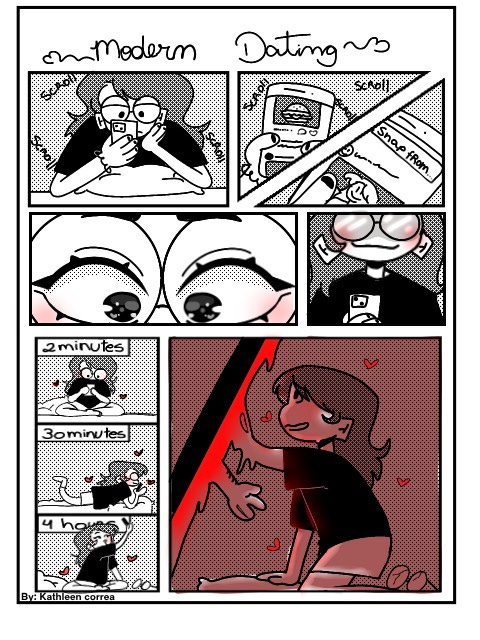The Reality Behind ‘Snapchat Dating’
Social media has taken over the ways of dating, creating a society of disillusionment and awkwardness
With technology gripping young adults all around the world through instant communication, it was inevitable that finding relationships would be done solely through digital platforms. But, has technology taken away that authentic personal connection? What about that “meet-cute” after bumping into someone at your local coffee shop? Or sitting behind someone you dream about in biology class?
Dating for young adults has changed drastically in the past 15 years, and it is all thanks to technology.
Technology is great for so many reasons as you can connect with people all across the world with a simple click of a blue arrow from iMessage. It served as this “magic hand” reaching through the ether that served to propel innovation and communication.
But, this technology has rapidly turned into a negative over a positive way to connect with those you love, especially through social media apps like Instagram, TikTok, Snapchat, and more.
Young adults tend to use these social media apps more now to communicate with one another, often sacrificing that vital face-to-face connection to send silly photos of themselves to friends.
Social media has made it easier to meet and connect with people, whoever they may be. Social media has not only made it easier to meet people, but to create this new “hook up culture” and “Snapchat dating,” and more times than not, taking the place of those dramatic “rom-com” reenactments like dancing in the rain and replacing it with sending photos of the ceiling to someone you fancy, asking, “WYD?”
I’ve seen people on Snapchat talk to people just for the “thrill of it,” but it can get toxic quickly. I’ve seen people add dozens of random strangers and change their contact to “Girl 1,” “Girl 2,” “Girl 3,” or “Boy 1,” “Boy 2,” “Boy 3,” etc. This completely dehumanizes and objectifies these people. On top of this, Snapchat allows you to share your location, thus these strangers you add might have access to where you are at any time, creating dangerous situations, especially for oblivious teens.
Social media creates a distrustful society. Even if they’re loyal, the knowledge of being able to easily flirt en masse with others over Snap creates distrust. This can evolve into a toxic relationship as the distrust grows. The lack of a real story leads to filling in the gaps - overthinking, paranoia, and questioning/doubting your “Snap” partner can create toxicity.
“Snapchat Dating”
Let me paint for you the art of “Snapchat dating:”
A total rando adds you on Snap. You add this stranger back “for the plot” and watch your “maybe love story” unfold. Maybe you send a photo of the ceiling. Then, if you’re brave enough, the side of your face. And then the other party sends their face back and you quickly determine if they are “worth snapping” based on how attractive they are. If you find they’re not “up to your standards,” boom: ghosted. But, if they’re up to par you continue to send selfies. Eventually, it turns into a “wyd,” or “what up.” Congratulations! You have now entered the talking phase. This phase lasts a couple weeks, maybe more than a couple if they leave you on “delivered” for days at a time. Then eventually, if the other party finds you attractive as well, you begin to “Snapchat date” where you never interact in person “IRL,” but you text over Snap. Here, you may send questionable photos, respond to icky messages, and more to perhaps multiple of these randos at a time.
The Reality
You can often be put into uncomfortable situations, like feeling pressured to send nudes, “sext,” or do things you never thought you’d ever do. Especially with Snapchat, messages disappear instantly, so it is easy to make a regrettable decision within a split second, instead of posting something online forever or saying something face-to-face. The pressure of social media and the accessibility of instant communication allows for teens to be easily absorbed into these bizarre fantasies and be taken advantage of.
The ability to craft whatever story around the little info you had allows human nature to fill in the gaps to make these stories complete. Yet, these gaps are often fictionalized as no true human interaction is acquired, and these personas displayed are completely distorted.
Relationships that revolve around social media can also feel superficial and contrived. There is no real connection; a simple “Quick Add’’ is nothing compared to having your breath taken away by someone across a room or falling absolutely smitten through conversation. Superficial relationships created by social media tendto be short term and lack an emotional connection between parties.
This leads into the idea of “hook-up” culture. How can one possibly get that physically intimate with someone for a night or two, and then go off with someone else a couple days later? How do you not emotionally waver with that fleeting connection?
I challenge you to think through your decisions in this fast-paced digital society. Is it worth spending time on a fictional relationship with someone you hardly know?
Meet people authentically and build that personal connection through a genuine “IRL” interaction.





thank you for this eve! I definitely think online and "snapchat" dating isn't talked about enough, especially in gen-z circles. loved this :)